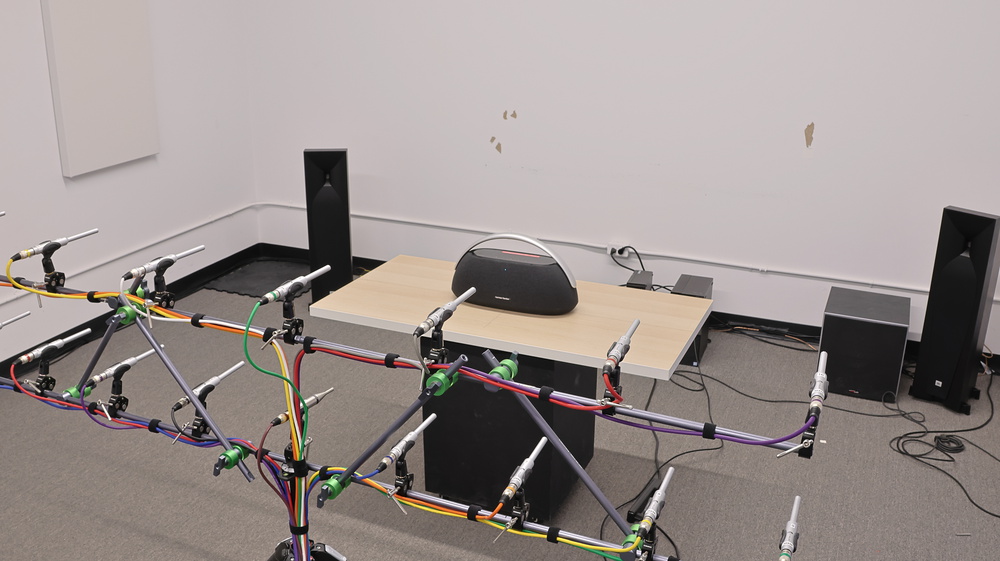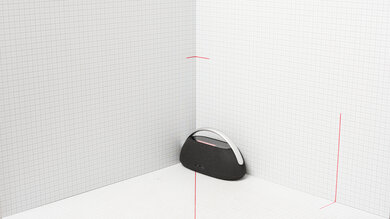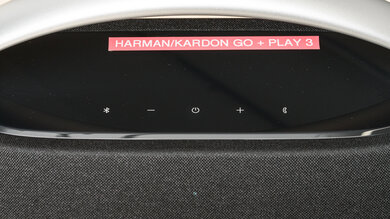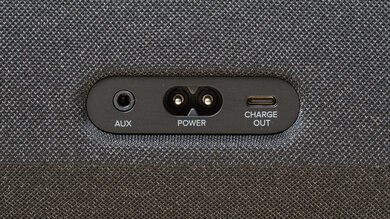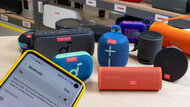The Harman/Kardon Go + Play 3 is a portable home speaker that shares its stylish, understated design with other home speakers from the brand. Its built-in carrying handle means it can accompany you from room to room, and Harman/Kardon promises that its three-way speaker design offers both stereo playback and powerful bass reproduction in a relatively compact package.
Our Verdict
The Harman/Kardon Go Play 3 is good for listening to music. Though it lacks low-bass, which is to be expected given its size, it still packs enough of a punch to keep kick drums feeling exciting, and basslines have a little extra warmth, which fills out the sound nicely. The mid and treble ranges are virtually flat, so instruments and vocals alike are reproduced accurately and with detail. A slight boost in the mid- and high-treble adds a little extra shimmer and presence to sounds like cymbals, without rendering them piercing. The speaker will playback stereo audio and gets plenty loud for large indoor rooms, but as it has a forward-facing design, the sound changes depending on your listening angle.
-
Balanced sound with a good amount of punch.
-
Handle makes carrying easy.
-
Plays back stereo audio.
-
No companion app to customize the sound.
-
Forward-facing speaker, so the sound quality depends on your listening angle.
The Harman/Kardon Go Play 3 is okay for watching videos. While it's not quite large enough to reproduce the low-bass rumbles of explosion effects, it does playback stereo audio, so details, like delay tails in sci-fi soundtracks, are present and detailed. It gets loud enough to fill a living room with audio, and its balanced mid-range ensures dialogue sounds natural, too. Its latency with iOS is good but very high with Android, which can lead to lip-sync issues. That said, different apps and devices compensate for latency in different ways.
-
Balanced sound with a good amount of punch.
-
Plays back stereo audio.
-
No companion app to customize the sound.
-
Forward-facing speaker, so the sound quality depends on your listening angle.
The Harman/Kardon Go Play 3 is great for listening to podcasts. It has a flat mid-range that reproduces voices accurately and with detail, while it gets plenty loud enough to fill up a large room with sound. Its carrying handle makes it easy to take with you from room to room, and you can pair it with two devices for easy switching between your phone and laptop. If there's a downside, it's that this is a front-facing speaker, so if you're standing behind it, voices can sound a bit muffled.
-
Balanced sound with a good amount of punch.
-
Handle makes carrying easy.
-
Forward-facing speaker, so the sound quality depends on your listening angle.
The Harman/Kardon Go Play 3 does not support voice assistants.
The Harman/Kardon Go Play 3 is not designed for outdoor use. It's not rated against water or dust ingress, nor does it have an impact protection rating. If you do choose to risk using it outside, you'll benefit from its well-balanced sound and ability to get loud enough to accompany your next summer BBQ. There is a touch of compression at high volumes, though, so it's not an ideal party starter, and its seven-hour battery life is only okay. In short, this speaker is a decent choice for using outdoors, but if that'll be your speaker's primary use, you should look elsewhere.
-
Balanced sound with a good amount of punch.
-
Handle makes carrying easy.
-
Plays back stereo audio.
-
No companion app to customize the sound.
-
No IP rating against dust or water ingress.
-
Forward-facing speaker, so the sound quality depends on your listening angle.
- 7.5 Music
- 6.7 Videos/Movies
- 8.0 Podcasts
- 3.1 Voice Assistant
- 7.1 Outdoors
Changelog
-
Updated Apr 14, 2025:
We added a reference to the Harman/Kardon Onyx Studio 9 in the App box.
- Updated Dec 05, 2024: Review published.
- Updated Nov 29, 2024: Early access published.
- Updated Nov 25, 2024: Our testers have started testing this product.
- Updated Nov 15, 2024: The product has arrived in our lab, and our testers will start evaluating it soon.
Check Price
Differences Between Sizes And Variants
The Harman/Kardon Go Play 3 comes in two color variants: 'Black' and 'Grey.' We tested the 'Black' variant, and this is its label. We expect our results to be consistent between variants.
If you encounter any other variants of this speaker, please let us know in the comments, and we'll update our review accordingly.
Compared To Other Speakers
The Harman/Kardon Go Play 3 is a portable home speaker that's designed to be carried with you around the house. It's larger and heavier than the Harman/Kardon Onyx Studio 8, which is, in turn, larger and heavier than the Harman/Kardon Onyx Studio 6. In each case, the larger the speaker is, the louder it gets, and the more bass it puts out. The Harman/Kardon Aura Studio 3 is the only 360-degree speaker from the brand we've tested, so it's the one to look into if you prioritize soundstage performance.
All of the Harman/Kardon speakers we've tested are meant for use indoors. If you're looking for a speaker that will work well both indoors and outdoors, the Bose SoundLink Max and the Ultimate Ears EPICBOOM are both rated IP67 against dust and water ingress, so they're worth considering.
Check out our recommendations for the best portable Bluetooth speakers, the best home speakers, and the best Bluetooth speakers.
The JBL Boombox 3 and the Harman/Kardon Go + Play 3 are medium-sized portable Bluetooth speakers with different strengths. The Harman/Kardon gets a little louder than the JBL and also puts out more consistent bass, so kick drums have just the right amount of punch. On the other hand, the JBL's almost 30-hour battery life is much longer than the Harman/Kardon's seven hours. The JBL is also rated IP67, so it'll withstand getting wet at your garden party, and it has a companion app, unlike the indoor-oriented Harman/Kardon. If you know you'll only use it indoors, the Harman/Kardon is well worth a look. If not, the JBL is the better pick.
The Harman/Kardon Go + Play 3 is about double the size of the Harman/Kardon Onyx Studio 9, so it's probably unsurprising that it gets a lot louder and has a more consistent bass response. Both of these speakers have sleek yet understated designs that should suit most rooms in your home; their lack of IP ratings means you won't want to take them outside, anyway. They also both have a similarly balanced frequency response that suits a wide variety of audio, from podcasts to music. But if you like to tweak your speaker's sound, you'll want the Studio 9 as it comes with a companion app with a 7-band EQ.
The Harman/Kardon Go + Play 3 and the Bose SoundLink Max are portable Bluetooth speakers with different strengths. The Harman/Kardon gets a touch louder and reproduces sound more accurately, but unlike the Bose, it doesn't come with a companion app to tweak the sound to your preferences. The Bose is better built and rated IP67, so it'll withstand a rain shower or windy day in your garden. The Bose's 15-hour battery life is also much longer than the Harman/Kardon's seven hours.
The Harman/Kardon Go + Play 3 and the Harman/Kardon Onyx Studio 8 are home Bluetooth speakers that share Harman's stylish design language. Of the two, the Onyx Studio 8 is the more visually arresting, with a wraparound band that doubles as a stand and handle. The Play 3 resembles a more traditional boombox. Ultimately, the Play 3 is the better pick for most people. It gets louder, reproduces bass more accurately, and is also cheaper. The Onyx Studio 8 is a bit lighter though, so if you'd prefer a speaker that's easier on the arms when moving from room to room, that's the one to pick.
The Harman/Kardon Go + Play 3 and the Harman/Kardon Aura Studio 3 are both home Bluetooth speakers with elegant, though very different, looks. The Play 3 looks like an elegant boombox, while the Aura Studio 3 looks a bit like an alien spaceship. Of the two, the Play 3 is the better pick for most people as it gets louder, reproduces audio more accurately, and is battery-powered. The main reason to pick the Aura Studio 3, aside from its unique style, is its 360-degree design, which means audio sounds the same from whichever angle you're listening from, unlike the forward-facing Play 3.
Test Results
The Harman/Kardon Go Play 3 shares a design language similar to that of other speakers from the brand, such as the Harman/Kardon Onyx Studio 8. The body of each is a blackish-dark grey, with a long light grey carrying handle that adds a touch of elegance to the appearance. The Play 3 is made of high-quality materials and has a tempered glass top, which adds to the speaker's premium feel. Rubber pads on the base protect the speaker from scratches and also leave a little airspace for the downward-firing driver.
The Harman Go Play 3 is amazingly portable. The long carrying handle means you can take this around with you like a handbag. Granted, it's not the lightest speaker around. The Harman/Kardon Onyx Studio 8 is a couple of pounds lighter, but you'll still be able to carry the Play 3 with one hand.
This is a well-built speaker made of high-quality materials. The cloth that covers the body is tightly woven and strong, so it's unlikely to tear, while the aluminum carrying handle is sturdy and comfortable. The glass panel on top feels tough, too. This speaker loses a few points because it's not rated against water or dust ingress, nor does it have an impact resistance rating. That shouldn't be a huge issue for most people, as this speaker is meant to be used indoors, but it's worth bearing in mind. If you're looking for a speaker that will work well outdoors, consider the Bose SoundLink Max.
Like the Harman/Kardon Onyx Studio 8, the Harman/Kardon Go + Play 3 speaker has good controls that are easy to understand. The volume up and down buttons are straightforward enough to operate, and you can use the Bluetooth button to pair this speaker with another unit. Unfortunately, there are no distinct play or pause buttons for controlling your audio. Instead, you control audio via the multifunction button. Here is the first and second part of the manual.
The touch-sensitive glass surface leaves a little to be desired: since it provides no tactile feedback, you have to look at the surface to use it. The speaker plays a chime when you power it on or off, enable Bluetooth pairing, and reach the maximum volume. However, there's no minimum volume chime, although an LED on the glass control surface shows the volume level visually.
You can tweak this speaker's sound by pressing combinations of buttons. Pushing the Bluetooth and volume down buttons at the same time lets you tweak the bass response, while pressing the volume up and multifunction buttons at the same time lets you adjust the treble response.
Harmon/Kardon says this speaker calibrates itself to its surroundings every time you power it on, but you cannot deactivate this feature. Regardless, this speaker has good frequency response accuracy. It's a medium-sized speaker, so it doesn't produce much low-bass thump, but the mid-bass region is well-balanced, so kick drums have just the right amount of punch. The high-bass and low-mids are a touch boosted, so basslines have extra warmth. The rest of the mid-range and treble range is virtually flat. Instruments sound accurate and detailed, while dialogue in podcasts is easy to understand. There's a touch of extra presence in the mid- and high-treble which adds shine to cymbals without rendering them piercing. The speaker sounds the same whether audio is played via Bluetooth or analog connection.
Though this speaker doesn't come with a companion app or have dedicated EQ controls, you can tweak the sound using combinations of the existing buttons. Pressing the Bluetooth and volume down buttons at the same time lets you cycle between the normal bass response and bass boost and bass reduction. Similarly, pressing the volume up and multifunction button at the same time lets you cycle between the default treble response and treble up and treble down modes. The speaker remembers which mode you left it in when powered off and on. Here is a graph showing measurements of the various EQ settings.
The Harman Go Play 3 has a very good soundstage performance. It can playback stereo content without downmixing it to mono, which is nice. That said, this is a forward-facing speaker, so audio does sound a bit different depending on the angle you're listening from, but not drastically so.
The dynamics performance is good. This speaker gets loud enough to fill a large space like a garage or loft with sound. It's also loud enough for use outdoors in a garden, but the speaker doesn't have any protection against the elements, so it's not really meant to be used outside. There is a bit of compression at max volume, so the bass is robbed of some punch.
The battery performance is okay. The manufacturer advertises a continuous battery life of eight hours, but we measured seven hours when playing back audio at 80 dB. That said, battery life varies with usage, so your experience may differ. There's also a power-saving feature that shuts the speaker off after about 15 minutes of inactivity. You can also charge your devices via the speaker's USB-C port.
The Harman/Kardon Go + Play 3 has dual far-field microphones built in, but they don't provide voice assistant support. Currently, we don't test the microphone recording quality of speakers.
This speaker doesn't have a companion app, but you can pair it with another Go + Play 3 by holding down the Bluetooth pairing button on both devices at the same time. If app support is important to you, consider the Harman/Kardon Onyx Studio 9.
You can play audio through this speaker via its 3.5 mm AUX port. It also has a USB-C port for power delivery. Harman/Kardon claims that the version of this speaker sold in the USA can play audio via the USB-C connection, but we were unable to get the unit we purchased to do so, despite trying several different phones and laptops.
The Harman/Kardon Go Play 3 has great Bluetooth connectivity. You can pair it with up to two devices simultaneously, and it has a fantastic Bluetooth range. That said, the range also depends on the connected device, so your experience may vary. When connected via iOS, the Bluetooth latency is pretty low, but when connected via Android, it's quite high. This can cause lip-sync issues while watching videos, but different applications and devices compensate for latency in different ways, so your experience may vary.
Comments
Harman/Kardon Go + Play 3: Main Discussion
Let us know why you want us to review the product here, or encourage others to vote for this product.
Update: We added a reference to the Harman/Kardon Onyx Studio 9 in the App box.
- 21010
Hi loverbeautyqueen, Testing for the Go + Play 3 was done over Bluetooth without the speaker plugged in. We did take additional measurements with the device playing audio over Analog and another over Bluetooth connected to power, here’s the graph for that. There wasn’t any major change to performance with the device plugged in. I took an additional measurement of the Max SPL with the device plugged in over Bluetooth and go the same result as when running off of battery power, 96dB SPL. Hope this helps, Matt
Thank you so much for responding! I’m so glad this review was done. This is one of my all-time favorite speakers. Got it for only 200 bucks, which is absolutely insane value for what it offers (of course it would be nice if it also offered wifi-streaming and an app but I still love it). It’s definitely worthy of the 7.5 rating. Seems like it’s very hard for BT speakers to reach the 7.5 mark, so it’s definitely impressive.
- 21010
Was this review of the go+play 3 done with or without the speaker plugged in? Asking because the speaker gets louder and has more powerful bass when it’s plugged in, similar to the onyx studio series from harman. I’m assuming the speaker being tested plugged in would lead to an even better frequency response, soundstage performance, and better dynamics, like higher spl db.
Hi loverbeautyqueen,
Testing for the Go + Play 3 was done over Bluetooth without the speaker plugged in. We did take additional measurements with the device playing audio over Analog and another over Bluetooth connected to power, here’s the graph for that.
There wasn’t any major change to performance with the device plugged in. I took an additional measurement of the Max SPL with the device plugged in over Bluetooth and go the same result as when running off of battery power, 96dB SPL.
Hope this helps, Matt
- 21010
Was this review of the go+play 3 done with or without the speaker plugged in? Asking because the speaker gets louder and has more powerful bass when it’s plugged in, similar to the onyx studio series from harman. I’m assuming the speaker being tested plugged in would lead to an even better frequency response, soundstage performance, and better dynamics, like higher spl db.
The full review has been posted here. Let us know what you think!
- 21010
HK products tend to have “modes” depending on if power is plugged in or not. You can also force the modes on battery only. There believed to be 3 modes on this model but you have to hold down the specific button sequence. Would be great if you could test that and see how different the response is for each mode! Thank you :)
Yes, there are three bass modes and three treble modes.
- 21010
HK products tend to have “modes” depending on if power is plugged in or not. You can also force the modes on battery only. There believed to be 3 modes on this model but you have to hold down the specific button sequence. Would be great if you could test that and see how different the response is for each mode! Thank you :)

